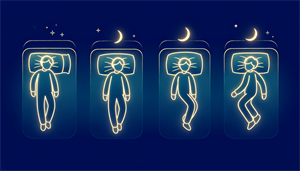If you’re wondering whether a dry nose can lead to snoring, the answer is yes. In fact, a “can dry nose cause snoring” situation can arise due to the impact on the nasal passages and air flow during sleep. In this article, we’ll explore how a lack of moisture in the nasal cavity can cause breathing difficulties and promote the conditions that lead to snoring. We’ll also discuss the underlying causes, preventative measures, and solutions for a dry nose to help ensure a quieter, more restful sleep.
Key Takeaways
-
A dry nose can contribute to snoring by causing congestion and difficulty in breathing through the nose, leading to vibrations in the throat while sleeping.
-
Factors causing a dry nose and subsequent snoring include dehydration, environmental irritants, sinus problems, nasal polyps, certain medications, and changes in humidity and temperature.
-
Preventative measures against dry-nose related snoring include maintaining hydration, using humidifiers to moisturize the air, and applying nasal saline sprays to keep nasal passages moist.
Dry Nose and Snoring: The Connection
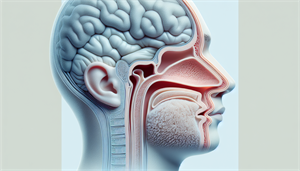
Snoring, often the bane of a peaceful night’s sleep, can be traced back to multiple causes, one of which is a dry nose. When the nose lacks moisture, it becomes less effective at warming and moisturizing the air, leading to congestion and difficulty in breathing through the nose. Consequently, this results in vibrations in the throat and mouth, generating the characteristic sound of snoring.
Sinus problems, such as sinus infections or allergies, can amplify this issue. These conditions lead to nasal congestion or obstruction, forcing a person to breathe through their mouth. This can relax the muscles in the back of the throat and narrow the airway, increasing the risk of tissues vibrating and creating the snoring sound when air passes through. What measures can we take to address these problems and ensure a restful night’s sleep?
Nasal congestion
Nasal congestion, a common symptom of a cold or allergies, can directly contribute to snoring. When individuals are forced to breathe through their mouths due to a blocked nose, the likelihood of snoring increases. Moreover, when the nose is narrowed or blocked due to a cold or other issues, fast-moving air through this restricted space is more likely to produce noisy snoring sounds.
Nasal polyps, growths that develop in the inflamed tissue of the sinuses and nose, can further obstruct the nasal passages. This obstruction can lead to mouth breathing, a major contributor to snoring. However, there are solutions available. Some options to decrease snoring include:
-
Nasal strips: These can enhance airflow through the nasal passages by actively maintaining the nostrils open and preventing congestion from restricting the airways.
-
Nasal dilators: These are small devices that are inserted into the nostrils to help keep them open during sleep.
-
Nasal sprays: These can help reduce inflammation and congestion in the nasal passages, allowing for easier breathing and reducing snoring.
It’s important to consult with a healthcare professional to determine the best solution for your specific situation.
Reduced airflow
Reduced airflow is another key contributor to snoring. When airflow is limited during sleep, it leads to a rumbling, rattling sound. Conditions like chronic sinusitis can exacerbate snoring by causing inflammation and congestion in the nasal passages, further restricting airflow and increasing the likelihood of snoring.
Physiological changes in the nasal passage when airflow is reduced encompass:
-
Nasal congestion
-
Irritation
-
Inflammation
-
Increased mucus production
These changes can also affect the soft palate, causing it to vibrate during sleep and contribute to the sound of snoring.
Understanding the reasons behind reduced airflow enables us to apply effective remedies. Yet, what triggers a dry nose initially?
Causes of Dry Nose
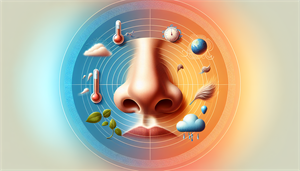
A dry nose can be attributed to various factors, including:
-
Seasonal allergies
-
Insufficient mucus production
-
Indoor allergens like dust mites, pet dander, or mold
-
Irritants
-
Dry indoor air
These factors can contribute to a dry nose, which is the opposite of a runny nose.
Dehydration is another common culprit behind a dry nose. When the body lacks adequate hydration, it can result in drying out the mucous membranes and nasal passages. Certain medications, specifically nasal decongestants and antihistamines, are also known to cause dry sinuses. We should further examine these causes.
Environmental factors
Dry air can have a significant impact on the nasal passages, causing them to dry out and become inflamed, resulting in a dry nose. This irritation and inflammation can exacerbate allergy symptoms and intensify snoring by reducing airflow and causing congestion.
Moreover, temperature changes also play a role. Cold temperatures can cause constriction of blood vessels in the nose, resulting in a dry nose. On the other hand, warmer temperatures and higher humidity can lead to dilation of blood vessels, potentially causing nasal congestion and snoring.
Environmental factors that can irritate the nasal passages and increase the likelihood of snoring include:
-
Fumes from chemicals
-
Smoke
-
Perfumes
-
Dust
-
Smog
-
Intense scents
Dehydration
Dehydration can lead to various adverse effects on the nose and mucous membranes, including:
-
Dryness of the membranes
-
Thickening of the mucus inside the sinuses
-
Impaired cilia function
-
Dry mouth
-
Reduced drug uptake in the nasal cavity
-
Depletion of water in the upper airway regions
-
Compromised breathing ability
-
Respiratory distress
-
Increased susceptibility to illness
Furthermore, dehydration can worsen snoring by causing the surfaces inside the mouth and throat to become sticky, leading to them sticking together during sleep. Thick mucus caused by dehydration may also worsen snoring by hindering proper airflow.
But what about the medications we take?
Medications
Certain medications can lead to a dry nose and consequently, snoring. Antihistamines, for instance, can cause dry nasal passages and discomfort, potentially contributing to snoring. Decongestants, on the other hand, induce nasal dryness through vasoconstriction, which decreases blood flow in the nasal mucosa and causes the tissue to shrink, while also drying out the nasal passages, potentially resulting in snoring.
Being conscious of these medications’ potential side effects is vital. Prolonged use of antihistamines and decongestants can lead to a host of issues, including:
-
Dry mouth
-
Dizziness
-
Urinary retention
-
Constipation
-
Increased appetite
-
Headaches
-
High blood pressure
-
Palpitations or arrhythmias
-
Paradoxical congestion
-
Restlessness
-
Insomnia
-
Irritability
-
Abdominal pain
-
Dryness of mouth and eyes
ACE inhibitors for high blood pressure, beta blockers for heart conditions, and NSAIDs for pain relief can contribute to nasal blockage and worsen snoring. These medications have the potential to affect nasal passages and lead to increased snoring.
How to Prevent Dry Nose-Related Snoring
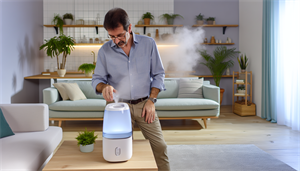
While dry nose-related snoring can be a nuisance, there are several preventative measures you can adopt. These include staying hydrated, using humidifiers, and incorporating nasal saline sprays into your daily routine.
Maintaining hydration is vital as it supports moist mucous membranes, effectively preventing the dryness causing nasal congestion and snoring. Humidifiers can also play a key role by increasing the humidity in the air, soothing the airways, reducing inflammation, and alleviating dryness in the nose. Moreover, nasal saline sprays can effectively prevent dry nose-related snoring by alleviating nasal dryness, decreasing congestion, and eliminating irritants from the nasal passages.
Hydration
Hydration plays a significant role in preventing dryness of nasal passages and snoring. We can prevent the nasal passages from drying out by keeping the mucous membranes moist. Dry nasal passages can lead to congestion, potentially worsening snoring by thickening the mucus and making it harder for cilia to push mucus along. Keeping them hydrated supports a healthy immune system and contributes to a clear airway.
Some ways to keep your nasal passages hydrated include:
-
Drinking plenty of water throughout the day
-
Using a humidifier in your bedroom
-
Using saline nasal sprays or rinses
-
Avoiding excessive caffeine and alcohol consumption, as they can dehydrate the body
By incorporating these practices into your daily routine, you can help prevent dryness of nasal passages and reduce snoring.
Apart from water, the consumption of hot liquids such as tea and broth, along with the intake of foods like:
-
pineapple
-
peppers
-
horseradish
-
garlic
-
green tea
can help in maintaining hydration of the nasal passages.
Humidifiers
Humidifiers can offer a helpful remedy for dry nose and snoring. By moisturizing dry nasal passages, reducing congestion, soothing a dry nose, and alleviating snoring caused by dry air irritation, humidifiers can greatly improve your sleep quality.
Aside from using humidifiers, assuring their cleanliness and safety is crucial for maximum benefits. A humidifier can effectively moisten the indoor air, providing relief for symptoms of sinusitis such as a stuffy nose, dry throat, and congestion.
Nasal saline sprays
Nasal saline sprays, a type of nasal spray, serve as another potent resource in fighting off dry nose-related snoring. These sprays are formulated with a combination of salt and water and are designed to alleviate congestion, moisturize the nasal passages, and eliminate allergens such as pollen from the nasal lining.
The recommended method for effective use involves:
-
Clearing the nasal passages by blowing the nose
-
Standing or tilting the head forward
-
Spraying the solution into one nostril while closing the other
-
Repeating the process for the other nostril to ensure even distribution of the solution and provide relief.
Addressing Underlying Conditions
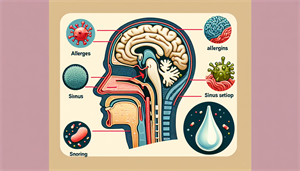
Although preventative measures are beneficial, addressing any inherent conditions causing dry nose-related snoring is crucial. Conditions like allergies, sinus infections, and a deviated septum may have a significant impact on the severity and frequency of snoring.
The most efficient method to tackle snoring due to these issues is to address the root cause. For instance, if you suffer from allergies, taking appropriate medication can help alleviate nasal congestion and snoring.
Allergies
Allergies can result in nasal obstruction and snoring as a result of increased blood flow and the release of inflammatory molecules, leading to nasal congestion.
The management of allergies related snoring involves:
-
Using suitable medication for effective control
-
Addressing the root cause of the allergy and treating it effectively
-
Alleviating nasal congestion and consequently, snoring.
Sinus infections
Sinus infections, also known as sinus infection, can lead to nasal blockage and snoring by inducing inflammation and obstructions in the sinus cavities. Treatments for sinus infections commonly include:
-
Antibiotics
-
Oral or topical decongestants
-
Prescription intranasal steroid sprays
-
Pain relievers
-
Warm compresses
By treating the infection, you can improve airflow and reduce snoring.
Deviated septum
A deviated septum is a condition where the dividing wall in the nose deviates in an S-shape or shifts to one side, obstructing airflow and causing snoring.
Surgical intervention, such as septoplasty, may be required to rectify a deviated septum, thus enhancing airflow through the nasal passages and diminishing snoring.
When to Seek Professional Help

If dry nose-related snoring persists or worsens, seeking professional help is recommended. Persistent snoring could be a sign of a more serious underlying issue, such as obstructive sleep apnea, which is characterized by excessive daytime sleepiness, loud snoring, waking up feeling tired, headaches upon waking, and a dry or sore throat.
The consequences of ignoring snoring, a potential sign of a serious sleep disorder, can encompass chronic headaches, sleep deprivation, and significant cardiovascular issues such as irregular heartbeats or arrhythmias and stroke. It’s important to address any sleep disorder promptly to avoid these health risks.
Summary
In conclusion, a dry nose can contribute to snoring in multiple ways. From nasal congestion and reduced airflow to environmental factors and certain medications, various elements can exacerbate snoring. Fortunately, by staying hydrated, using humidifiers, and incorporating nasal saline sprays into your daily routine, you can effectively prevent dry nose-related snoring. Additionally, addressing underlying conditions like allergies, sinus infections, and a deviated septum is crucial in reducing snoring and improving your sleep quality. Don’t let snoring keep you or your loved ones awake - take action today for a peaceful night’s sleep.
Frequently Asked Questions
Do dry nostrils cause snoring?
Yes, dry nostrils can cause snoring because they irritate the membranes in the nose and throat, making snoring more likely. Using a humidifier in your bedroom can help keep the air moist and reduce snoring.
Does clearing your nose stop snoring?
Clearing your nose before bed, such as with a saline spray and blowing your nose, can help open the nasal airway and reduce snoring. So, it can be an effective way to tackle snoring.
Can nasal sprays help with snoring?
Yes, nasal sprays can help reduce snoring and breathing difficulties, as shown in a study with children. It may be worth trying to see if it helps with your snoring.
Conditions that may have snoring as a symptom?
Snoring may be a symptom of conditions such as sinus infections, nasal polyps, and tonsillitis, as they can obstruct the free flow of air at the back of the mouth and nose, leading to vibrations in the throat muscles. (No date)
When should I seek professional help for snoring related to a dry nose?
You should seek professional help for snoring related to a dry nose if it continues or worsens, as it could indicate a more serious underlying issue.

